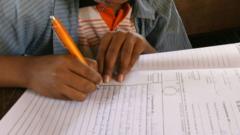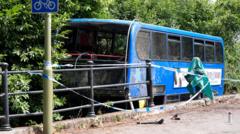How Did a Blast in Central Africa Lead to the Tragic Death of 29 Pupils During Exams?

## Understanding the Impact of School Security in Crisis Zones: A Case Study from the Central African Republic
In the wake of a tragic incident in the Central African Republic (CAR), where 29 children lost their lives due to a panic-induced crush following an explosion, it becomes increasingly important to address the broader implications of safety in schools, particularly in regions facing political instability and security challenges. This article delves into the multifaceted aspects of school security, the psychological impact on students, and the necessary measures for creating safer educational environments in crisis zones.
### The Incident: What Happened?
On a day meant for academic achievement, the atmosphere turned catastrophic. The explosion from an electricity transformer created a wave of panic among nearly 6,000 students participating in the baccalaureate exams at Lycée Barthélémy Boganda in Bangui, the capital of CAR. The ensuing chaos led to a deadly crush, claiming the lives of 29 students and injuring over 280 others.
#### Key Details of the Incident:
- **Location:** Lycée Barthélémy Boganda, Bangui, Central African Republic
- **Event:** High school baccalaureate exams
- **Casualties:** 29 fatalities, over 280 injuries
- **Cause of Panic:** Explosion from an electricity transformer
- **Government Response:** National mourning declared and free hospital treatment for the injured
### The Context: Political Instability in the Central African Republic
The CAR has been grappling with severe political instability and security issues for many years. The government, led by President Faustin-Archange Touadéra, has faced ongoing threats from armed groups seeking to destabilize the administration. This precarious environment not only affects governance but also significantly impacts educational institutions.
#### Challenges to Education in Crisis Zones:
1. **Physical Safety Risks:** Explosions, violence, and armed conflicts disrupt learning environments.
2. **Psychological Trauma:** Students and educators experience heightened anxiety and trauma, affecting mental health.
3. **Disruption of Learning:** Frequent interruptions lead to significant gaps in education, impacting long-term academic outcomes.
### The Importance of School Security
Given the circumstances surrounding the tragic events in Bangui, the importance of robust school security measures cannot be overstated. Schools should be sanctuaries of learning, free from the threats of violence and chaos.
#### Key Considerations for Enhancing School Security:
- **Infrastructure Assessment:** Regular evaluations of school buildings and surrounding areas to identify potential risks.
- **Emergency Preparedness Plans:** Developing clear protocols for emergencies, including evacuation procedures and communication strategies.
- **Community Engagement:** Involving local communities in security discussions and training to foster a culture of safety.
- **Mental Health Support:** Providing psychological support to students and staff to cope with trauma and anxiety.
### Psychological Impact on Students
The aftermath of such incidents leaves deep psychological scars on young minds. Experiencing fear and loss at a formative age can lead to long-term emotional and cognitive challenges.
#### Common Psychological Effects:
- **Post-Traumatic Stress Disorder (PTSD):** Symptoms may include flashbacks, severe anxiety, and uncontrollable thoughts about the event.
- **Depression:** Feelings of sadness, hopelessness, and disconnection from peers can emerge.
- **Academic Challenges:** Difficulty concentrating and a lack of motivation to attend school can hinder academic performance.
### The Role of Government and NGOs
In the face of such tragedies, the role of government and non-governmental organizations (NGOs) becomes crucial. They must prioritize the safety of educational environments and provide necessary resources for rebuilding trust and stability.
#### Strategies for Government Action:
1. **Policy Implementation:** Establishing laws and regulations to ensure the safety of children in schools.
2. **Funding for Security Measures:** Allocating budgets to improve infrastructure and security personnel presence.
3. **Training for Educators:** Providing training for teachers and staff on emergency response and mental health awareness.
#### NGO Contributions:
- **Advocacy:** Raising awareness about the need for safe educational environments.
- **Psychosocial Support Programs:** Offering counseling and therapy for affected students and families.
- **Community Education:** Teaching communities about safety practices and emergency readiness.
### Moving Forward: Building Resilient Educational Systems
As the Central African Republic mourns the loss of young lives, it is imperative to reflect on how to prevent such tragedies in the future. Building resilient educational systems requires a multifaceted approach that encompasses security, mental health support, and community involvement.
#### Steps Toward Resilience:
- **Investing in Infrastructure:** Upgrading school facilities to withstand potential threats and ensuring safe access routes.
- **Community-Based Programs:** Creating initiatives that empower communities to take an active role in protecting their schools.
- **Mental Health Awareness Campaigns:** Promoting mental health resources to help students and educators cope with trauma.
### Conclusion: A Call for Action
The tragic events in the Central African Republic serve as a stark reminder of the fragility of educational environments in crisis zones. As we reflect on the loss of young lives, it becomes imperative to take collective action to ensure that schools are safe havens for learning and growth.
By strengthening security measures, focusing on mental health support, and fostering community engagement, we can work toward a future where no child has to fear for their safety while pursuing an education.
What measures do you think should be implemented to enhance school safety in conflict zones?
### FAQs
What are the immediate steps schools should take in the event of an explosion or emergency?
In the event of an explosion, schools should immediately initiate their emergency preparedness plans, which include evacuation procedures, notifying emergency services, and ensuring all students and staff are accounted for.How can mental health support be effectively integrated into educational systems?
Mental health support can be integrated through counseling services, training teachers to recognize signs of trauma, and providing resources for students to cope with their experiences.What role do parents play in ensuring school safety?
Parents can advocate for safety measures in schools, participate in community discussions about security, and support their children’s emotional needs during crises. In light of these tragic events, how can we collectively ensure that schools become safe havens for our future generations? #SchoolSafety #CrisisEducation #MentalHealthAwarenessPublished: 2025-06-26 12:10:12 | Category: world



